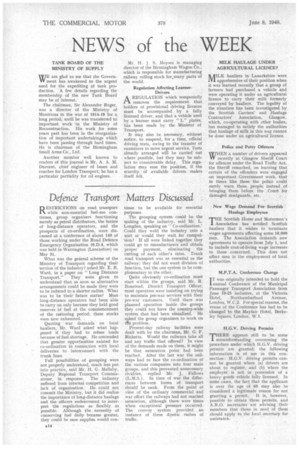Defence Transport
Page 16

If you've noticed an error in this article please click here to report it so we can fix it.
Matters Discussed
RESTRICTIONS on road transport IN, while non-essential fuel-use continues, group organisers functioning merely as petrol distributors, the future of long-distance operators, and the prospects of co-ordination, were discussed at a conference of about 140 of those working under the Road Defence Emergency Organisation 10.D.4, which was held in Warrington (Lancashire) on May 31.
What was the general scheme of the Ministry of Transport regarding their -section of the industry? asked Mr. E. B. Ward, in a paper on "Long Distance Transport." They were given to understand that as soon as alternative arrangements could be made they were to be reduced to a shorter radius. What was to be their future status? Most long-distance operators had been able to carry on only because they held good reserves Of fuel at the commencement of the rationing period; these stocks were now exhausted.
Quoting war demands on local hauliers, Mr. Ward asked what happened if they had to refuse loads because of fuel shortage. He contended that greater opportunities existed for co-ordination in connection with local deliveries to interconnect with the trunk lines Full possibilities of grouping were not properly understood, much less put into practice, said Mr. H. G. Mallaby, Deputy Regional Transport Commissioner, in response. The industry suffered from internal competition and lack of organization. He could not commit the Ministry, but it did realize the importance of long-distance haulage and the officers endeavoured to interpret the regulations as flexibly as possible. Although the necessity of conserving fuel daily became greater, they could be sure supplies would con tinue to be available for essential purposes.
The grouping system could be the making of the industry, said Mr. L. Longden, speaking on "Co-ordination.' Could they weld the industry into a unit or would they wait for compulsion? If all were linked together they could go to manufacturers and obtain proper payment, eliminating the cutting of each other's rates. Trunk road transport was as essential as the railway; they did not want division of function, but the one system to be complementary to the other.
Quite obviously co-ordination must start within the groups, said Mr. R. Boustead, District Transport Officer; most operators were insisting on trying to maintain pre-war services with their pre-war customers. Until there was planned operation inside the groups they could not have the country-wide system that had been visualized. He aiked the group organisers to work on tIe problem.
Present-day railway facilities were dealt with by the chairman, Mr. G. F. Ricketts. Would the railways take all and any traffic that offered? In view of the demands made on them, it might be that • saturation point had been reached. After the last war the railways had to face the co-ordination of the various companies into four main groups, and this prevented unnecessary rivalries, replied Mr. J. Fallows (L.M.S.). In time of war the differences between forms of transport should be sunk. From the point of view of the ordinary commercial and war effort the railways had not reached satuiation, although there were times when exceptional pressure occurred. The convoy system provided an instance of these drastic rushes of traffic.




















































